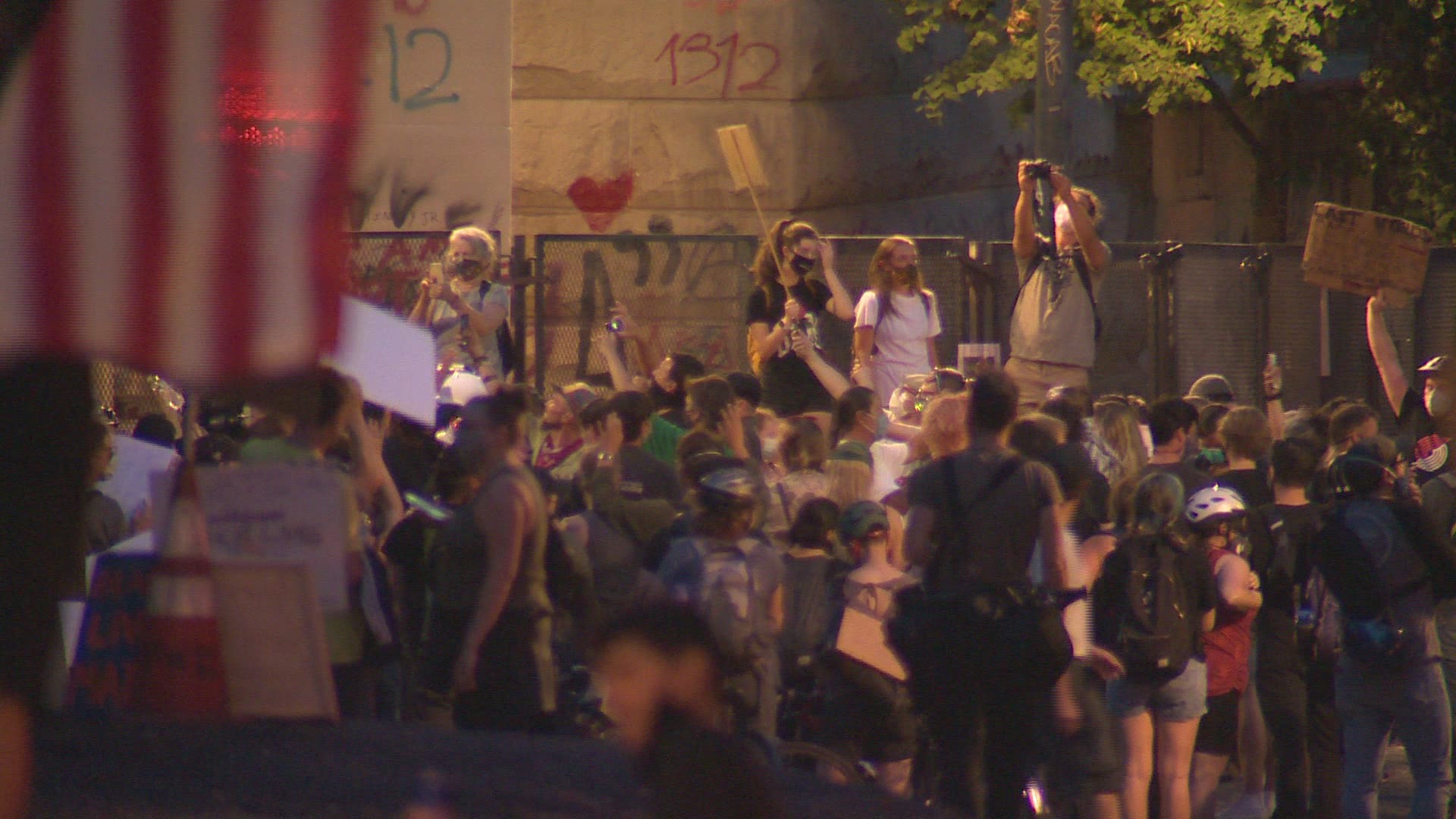PORTLAND, Ore — Many health care workers are among the nightly crowds of protesters.
Trained to advocate for their patients, many nurses say they feel called to stand up for Black lives and equality, and against systemic racism.
In light of George Floyd's death, registered nurse Travis Nelson couldn't sit idly by.
“I realized that I could have been George Floyd. That could have been an officer's knee on my neck so it felt important to get out and bring attention to the cause of black lives matter once again,” Nelson said.
More than 60 days later, he's still out there almost every single night. As a Black man and a nurse, Nelson has plenty of reasons that motivate him to do so.
“Nurses become nurses because we care about people and we should care about people regardless of their skin color,” Nelson said.
He stands alongside hundreds - even thousands - of other health care workers to fight back against systemic racism.
“It’s called systemic racism for a reason: there are systems that need to change," Nelson said. "Whether that's law enforcement and how they approach that or whether it’s health care and how we approach racial disparities in health care. I believe we're beginning to see some of that change but I don't want us to lose focus as a country, a state or here in Portland. We need to keep that focus on Black Lives Matter.”
Over her decades-long career in ER's and ICU's, Adrienne Enghouse says she's seen inequities in access to care, health outcomes and even heard stories about employment issues.
“We must fix this now and stand with our black brothers and sisters to fix it,” Enghouse told KGW. “That's why you see so many nurses and other health professionals – doctors, techs, professionals – out here because that's our training. We advocate for people all the time. And the system fails them.”
Enghouse says she's looking to go a step further by using her skills as a volunteer medic at the protests, like Chris Wise.
He is using his EMT training to treat demonstrators hurt demonstrating in Portland's streets. While trying to treat people hit by tear gas, pepper spray, batons and flash bangs, he and a few other volunteer medics say they have been hit.
"I’ve been shot in the leg trying to pull somebody out of tear gas. I got hit in the head last Tuesday from a tear gas canister. I still have concussion,” Wise said.
He and a few other volunteer medics teamed up with the ACLU of Oregon and filed a federal lawsuit against the Department of Homeland Security, U.S. Marshals service and city of Portland.
They argue acts like that violate the constitution.
“I believe that is in a coordinated effort to make it so we have less medics so people don't want to come out,” Wise said. “I'm going to be at the Justice Center as often as I can, as long as people are putting themselves in danger, as long as people are getting hurt and as long as people are firing tear gas and rubber bullets at them.”
RELATED: Why is there no curfew in Portland?
On social media, many people have expressed concerns that these health care workers attending protests with hundreds - even thousands - of people are exposing themselves to the potential to catch the coronavirus, and are then returning clinics or hospitals and caring for patients during a pandemic.
We asked the nurses we spoke with about that very issue; Nelson doesn’t currently work in a health care setting because his focus is now on policy. Enghouse, meanwhile, said she wears her face shield and mask while she's down at the demonstrations.
Of course, we haven't talked to every health care worker but Enghouse says other nurses she protests alongside are wearing personal protective equipment (PPE) as well.
As recently as last week, Multnomah County health officials said data doesn't point to any COVID-19 outbreaks linked to protests in Portland.
KGW reached out to Providence Health & Services and OHSU to find out if the health care organizations support employees protesting. We also asked if they have policies in place regarding employees partaking in demonstrations in order to protect staff and patients from coronavirus.Providence sent us the following statement:
“While we don't have a "protest policy", we regularly communicate to our caregivers the importance of taking appropriate precautions when they are away from work.
We take the temperature and screen every caregiver as they enter the hospital for their shift, and require masks and face shields to be worn by every caregiver who interacts with patients.”
OHSU sent us the following:
“OHSU President Danny Jacobs, M.D., M.P.H., FACS, has emphasized the importance of standing up against structural racism. To that end, we recognize the important role our students, faculty, residents and staff play as members of the broader community and respect their right as individuals to be involved in lawful civic and community activities. Health care workers understand the importance of taking steps to reduce the spread of the virus by measures available to all of us: Physical distancing, wearing masks, and washing hands.
Please note that all OHSU employees are screened for COVID symptoms prior to reporting to work, and they also wear all appropriate personal protective equipment at work while interacting with patients and other employees.”

